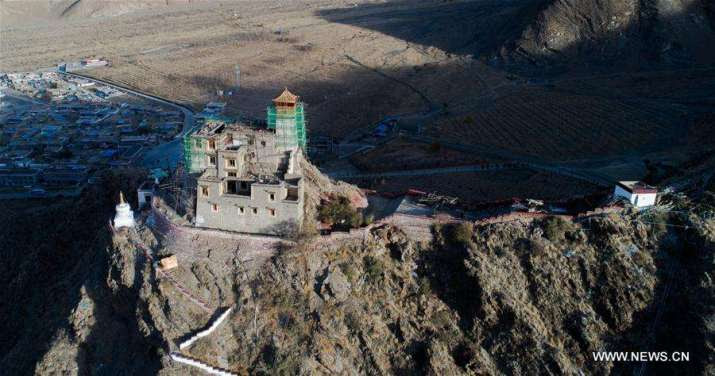
Yumbu Lakhang is an ancient structure in the Yarlung Valley in the vicinity of Tsetang, Nêdong County, the seat of Lhoka Prefecture, in the southern Tibet Autonomous Region of China.
According to legend, it was the first building in Tibet and the palace of the first Tibetan king, Nyatri Tsenpo.
Yumbu Lhakhang, an ancient palace believed to be the oldest of its kind in Tibet, is undergoing an extensive state-funded 10 million yuan (US$1.5 million) renovation project aimed at ensuring that the aging structure will continue to survive for many more years to come, Chinese media have reported.
The palace, believed to date to the 2nd century BCE, is in poor condition, with a decaying wooden structure and cracked walls, according to Champa Tsering, head of the Cultural Relics Bureau in Shannan, a prefecture-level city in the southeast of the Tibet Autonomous Region. Tsering noted that renovation work, which began in November last year, will focus on reinforcing the underlying structure, without altering the palace’s original appearance.
Perched atop Tashi Tsere Hill in the Yarlung Valley about 192 kilometers southeast of Lhasa, Yumbu Lhakhang—yumbu means female deer in Tibetan and the name is reportedly derived from the shape of the hill it stands upon—is currently closed to visitors while the renovation project is underway. Work is expected to be completed by April this year.
Yumbu Lhakhang is said to have been built in the 2nd century BCE on behalf of Tibet’s first king, Nyatri Tsenpo, who is believed to have reigned from 127 BCE. The year of Nyatri Tsenpo’s enthronement marks the first year of the Tibetan calendar, and Losar, the traditional Tibetan New Year, is celebrated in his honor.

According to legend, during the reign of Tibet’s 28th king, Thothori Nyantsen, in the fifth century CE, a number of relics fell from the sky onto the roof of the place. They included a jewel inscribed with the mantra om mani padme hum and a volume of scriptures that no one at the time was able to read, but were subsequently found to be Buddhist sutras. Yumbu Lakhang later became the summer palace of Tibet’s 33rd king and founder of the Tibetan Empire (618–842), Songtsen Gampo (b. 557–617, d. 649). His consort, the Chinese princess Wencheng, a member of a minor branch of the royal clan of the China’s Tang dynasty is often credited, along with Songtsen Gampo’s Nepalese wife, Bhrikuti, with introducing Buddhism to Tibet. Songtsen Gampo later transferred the seat of his temporal and spiritual authority to Lhasa, and Yumbu Lhakhang was used as a shrine.
During the reign (1642–82) of the 5th Dalai Lama Ngawang Lobsang Gyatso (1617–82), the palace was turned into a monastery for the Gelug school of Tibetan Buddhism. The monastery later sustained severe damage during China’s Cultural revolution and was reduced to a single story structure, but was rebuilt in 1983. The palace has been listed as a regional-level cultural relic since 1962.
The existing three-floor structure of the tallest tower comprises numerous Buddhist chapels, accommodation for monks, along with other buildings. The first floor houses a small hall and a chapel that enshrines statues of Nyatri Tsenpo, Songtsen Gampo, and various ministers and officials. The second floor contains a Sutra Chanting Hall with statues of Shakyamuni Buddha, Chenrezig/Avalokiteshvara, Maitreya, Je Tsongkhapa, founder of the Gelugpa school, Padmasambhava, and four Vajradhara sculptures. The walls are decorated with murals recording stories and legends from early Tibetan history, the most famous of which depicts Nyatri Tsenpo’s arrival in Tibet from heaven.
According to a government white paper published in 2015, the Xinhua News Agency reported, Beijing has spent more than 1.4 billion yuan (US$219 million) since the 1980s restoring Tibetan cultural relics and refurbishing key monasteries.












